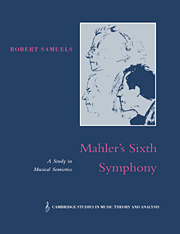Book contents
1 - Music, theory and signification
Published online by Cambridge University Press: 17 November 2009
Summary
Analysis of music, at least in the century or so of its modern history as an intellectual discipline, has tended to assume that musical works can and do bear meaning. The definition of what sort of meaning this might be, however, has been neglected, perhaps from a fear of the aesthetic and epistemological complications that the issue raises. Comparisons of music with language, or of music with literature, have only recently advanced beyond the simple mapping of the terms of description of one sort of human expression onto another, without first establishing the grounds on which the comparison can be made. However, the body of thought which has sought to define a general theory of signification (that is, structuralist and post-structuralist semiotics) has often found it difficult to deal with music as an instance of a mode of human communication. Musical works seem by turns to be anomalous amongst the arts because of their lack of linguistic articulation and referential content, or to hold the key to understanding the intractable questions of deconstructive intertextuality. It is no accident that on the one hand, Paul de Man's famous discussion of Jacques Derrida's epistemology,‘The Rhetoric of Blindness’, should rely on music as a metaphor for textual signification (de Man 1983: 126-31); nor that on the other hand, there is no discussion of an individual musical work to be found anywhere amongst Derrida's or de Man's essays.
- Type
- Chapter
- Information
- Mahler's Sixth SymphonyA Study in Musical Semiotics, pp. 1 - 17Publisher: Cambridge University PressPrint publication year: 1995



